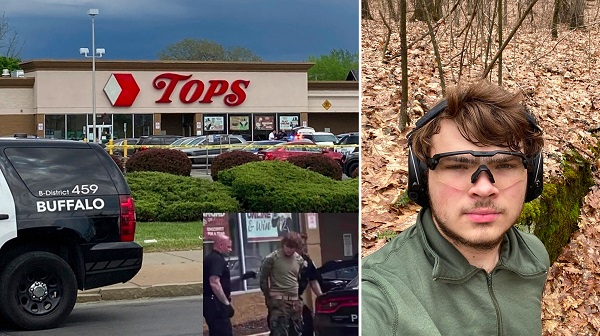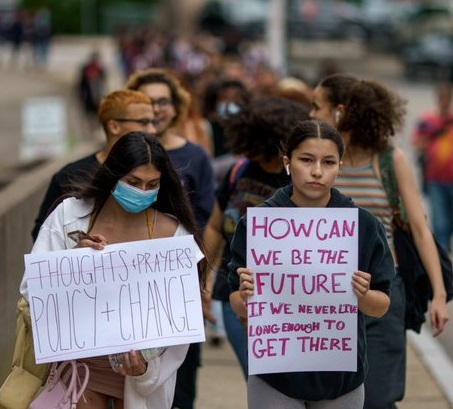Poll: Most Americans Say These 2 Gun Measures Could Stop Mass Shootings. The Senate Isn’t Considering Them!

Yahoo.com, By Andrew Romano-West Coast Correspondent, Posted June 21st 2022
With the U.S. Senate poised to defy all expectations and actually pass bipartisan gun-safety legislation in the wake of last month’s deadly mass shootings in Uvalde, Texas, and Buffalo, N.Y., a new Yahoo News/YouGov poll shows that clear majorities of Americans support each of the deal’s major provisions.
But an even greater number of Americans favor two reforms that Republican legislators refused to include in the framework they unveiled with their Democratic counterparts earlier this week: universal background checks for all gun sales (71%) and raising thenationalage to purchase semiautomatic weapons from 18 to 21 (68%)
● 66% of Americans favor and 19% oppose “expanding criminal and mental background checks for buying guns to include juvenile records”
● 66% support and 14% oppose “more government spending on security services in public K-12 schools”
● 67% support and 14% oppose “more government spending on mental health programs in public K-12 schools”
● And 54% favor and 26% oppose “expanding so-called red-flag laws, which make it easier for authorities to confiscate guns from people reported to be a threat.”
At the same time, those are also the only two policies that more than half of Americans (55% and 53%, respectively) say might “help stop some mass shootings in the future” — raising the question of why the Senate isn’t going further.

The survey of 1,541 U.S. adults, which was conducted from June 10 to 13, found that the current bipartisan plan could prove very popular if it’s ultimately signed into law. When asked about its four key reforms:
In the U.S. Senate, where the filibuster creates a 60-vote threshold for legislation, it’s notoriously difficult to create enough bipartisan consensus for action, especially on divisive issues such as gun policy. It appears that the modest reform deal may have enough momentum, however. Ten Republican senators initially endorsed the outline, and Minority Leader Mitch McConnell even called it a “step forward.”
“Would I like to see more? Yes, of course,” activist David Hogg, a survivor of the 2018 Stoneman Douglas High School shooting in Parkland, Fla., tweeted Tuesday. “But even if this saves one life and passes, it’s more than has been done in the past 30 years.”
Given such political and procedural hurdles, no one who has followed America’s gun stalemate in recent years should be surprised that the Senate framework does not include a nationwide ban on assault weapons or a similar ban on high-capacity magazines, which enable a shooter to fire more than 10 consecutive rounds before stopping to reload — even though 52% of Americans favor the former and 50% favor the latter, compared with just three in 10 who are opposed.
In this case, more Republicans oppose (about 45%) than favor (about 35%) both restrictions, and as a result GOP lawmakers have refused for years to consider them.
A customer browses guns for sale at RTD Arms & Sport in Goffstown, N.H., on June 2. (Ed Jones/AFP via Getty Images)
But that’s not the case with universal background checks or raising the purchase age for semiautomatic weapons. In fact,
- 63% of Republicans favor and just 24% oppose “requiring criminal and mental background checks for all those buying guns, including at gun shows and private sales”
- And 59% favor and 28% oppose “raising the age to purchase selected semiautomatic firearms referred to as assault weapons from 18 to 21”
That makes both provisions more popular with the GOP than expanding red-flag laws, which is already part of the framework even though more Republicans oppose it (42%) than favor it (39%).

So why not include universal background checks and raising the purchase age for semiautomatic weapons too?
A separate question provides a clue. Asked whether “the laws covering the sale of handguns should be … more strict than they are now,” 50% of Americans say yes — including a 75% majority of Democrats and a 47% plurality of independents — while 29% of Americans say they want “no change” and 12% say such laws should be “less strict.”
Yet more than six in 10 Republicans — 48% who want no change, 14% who want less regulation — oppose stricter gun laws. Any reform that could limit access to actual firearms — as opposed to addressing mental health or school security — represents a political risk for GOP lawmakers.
Republicans and Democrats also disagree over which measures might actually prevent at least some mass shootings in the future. Only 16% of Americans — including 11% of Democrats and 24% of Republicans — believe “there is no way to stop mass shootings in the U.S.” But while the vast majority of Democrats (76%) think “stricter gun laws could make mass shootings less likely,” most Republicans (60%) say the opposite. Instead, when asked “which of the following measures could help stop some mass shootings in the future,” a majority of Republicans name only one: more security in K-12 schools (56%).
As it turns out, Democrats see school security (39%) as the least promising measure on the list. All the rest of the reforms — universal background checks (69%), red-flag laws (62%), raising the semiautomatic purchase age (69%), banning assault weapons (68%), banning high-capacity magazines (68%) and more mental health programs in K-12 schools (52%) — strike them as more effective.
The Yahoo News survey was conducted by YouGov using a nationally representative sample of 1,541 U.S. adults interviewed online from June 10 to 13, 2022. This sample was weighted according to gender, age, race and education based on the American Community Survey, conducted by the U.S. Bureau of the Census, as well as 2020 presidential vote (or nonvote) and voter registration status. Respondents were selected from YouGov’s opt-in panel to be representative of all U.S. adults. The margin of error is approximately 2.9%.








